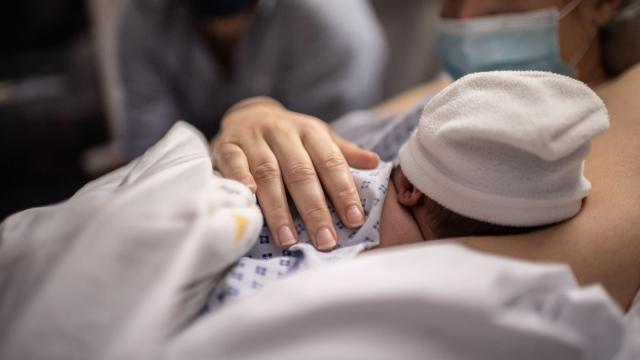Researchers in the UK and affiliated with the World Health Organisation are sounding the alarm over a common bacteria that can seriously harm pregnant people and their babies. In a new report released this week, the group estimates that infections caused by group B streptococcus were linked to 46,000 stillbirths, 91,000 newborn deaths, and over a half-million premature births worldwide last year. The numbers are dire enough that the WHO and partners are calling for a maternal vaccine to prevent the bacterial disease.
Group B streptococcus, or Group B strep, are round bacteria that typically cluster together into single-line chains. Though there are seven broad groups of streptococcus bacteria, there’s only one known species of bacteria belonging to group B, called Streptococcus agalactiae. These bacteria are routinely found in the guts and vaginas of up to a third of humans (as well as some animals), and it usually doesn’t cause illness.
During pregnancy, however, the bacteria can migrate to other parts of the body, like the urinary tract. It can also be passed down to a foetus in the womb or to a newborn during delivery or the first weeks of life. Urinary tract infections in the parent can raise the risk of premature delivery, while infections of the placenta and amniotic fluid raise the risk of premature deliveries, stillbirths, newborn deaths, and congenital defects. In infected newborns, the bacteria can cause sepsis, a widespread inflammation that overwhelms the body and can quickly turn fatal.
The infection has long been known as a common cause of newborn sepsis. But in 2017, researchers with the London School of Hygiene & Tropical Medicine, the WHO, and others made the first attempt to quantify its global harms. They estimated that about 150,000 stillbirths and newborn deaths a year could be attributed to Group B strep. This new report, helmed by the same groups, is the first to gauge the toll of premature births, which not only raise the risk of newborn death but also long-term complications like stunted development and congenital defects.
All told, they estimated that about 20 million pregnant people in 2020 were colonised with Group B strep, putting them at risk for a serious infection. The estimates for stillbirths and newborn births in 2020 were about the same as they were in 2017. But they now estimate that these infections contributed to 518,000 premature births in 2020. The bacteria infected almost 400,000 newborns, and about 40,000 infants were estimated to be left with neurological impairment as a result of infection. Though the bacteria is found everywhere, pregnant people and their children in low- to middle-income countries were the most likely to be harmed by the infection, particularly in Africa.
“This new research shows that Group B strep is a major and underappreciated threat to newborn survival and wellbeing, bringing devastating impacts for so many families globally,” said Phillipp Lambach, medical officer with the WHO’s Immunization, Vaccines and Biologicals department, in a statement from the WHO announcing the report.
Pregnant people who test positive for Group B strep are now given prophylactic antibiotics to prevent newborn transmission. But the experts note that antibiotics aren’t able to prevent most cases of stillbirth and premature delivery associated with the infection, nor are they without side effects.
The most promising long-term solution to Group B strep, the report authors say, is a vaccine that can be given to people early in pregnancy. They estimate that an effective vaccine provided to even 70% of pregnant people would prevent about 50,000 deaths and over 170,000 preterm births a year. Depending on the cost of a vaccine, it would also likely save money down the road, they add. But while there are several experimental vaccine candidates in the research pipeline, efforts have been unfruitful for decades at this point.
“Maternal vaccination could save the lives of hundreds of thousands of babies in the years to come, yet 30 years since this was first proposed, the world has not delivered a vaccine. Now is the time to act to protect the world’s most vulnerable citizens with a GBS vaccine,” said Joy Lawn, director of the Maternal Adolescent Reproductive & Child Health Centre at the London School of Hygiene & Tropical Medicine, in the WHO statement.
